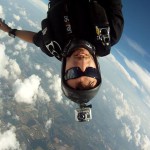Recommended Posts
QuoteThe Contour has a laser pointer that shows you that the camera is turned
the gopro is more "friends eyes'" friendly though.
"its just a normal day at the dropzone until its not"
1653
1653
dude....you have 19 jumps, youre not even qualified to sign a log book yet let alone give reasonable advice about something in which you have no experience. now focus more on learning how to change a closing loop and what happens when you stick your legs out, than telling people with hundreds or thousands more jumps than you what the proper practice should be.
"its just a normal day at the dropzone until its not"
1653
1653
yoink 321
QuoteThere really isn't anything that complicated about jumping a camera. Some people on here get all worked up when a 100 jump wonder straps one on. The 200 rule really doesn't apply across the board.
MAYBE there are exceptions... there usually are to any situation. The problem is that once you've made one exception, everyone thinks that they're one. That's why posts or even opinions from experienced jumpers like yours are both profoundly unhelpful, and profoundly ignorant of skydiving as a larger community. You set a precedent that you dont' give a shit about defending and maybe several months from now some newbie DGIT will come across your post and use it as justification for doing something they're not ready for, and they'll get in trouble.
Rules, or guidelines if you prefer, have to be set for the lowest denominator - the commonly least competent person. Or are you OK with a few people a year killing themselves and others because they were jumping a camera before they were ready?
What's the number you're comfortable with?
How about this? We try to change it for 2 years - a trial period. Anyone over 50 jumps can wear one, and you can tell me in 2 years time if you think the benefit has been worth the cost...
Fortunately, this thread has moved beyond a simple camera issue, and is (in my opinion) far more valuable to a new jumper as a lesson on how NOT to solicit advice.





Share this post
Link to post
Share on other sites